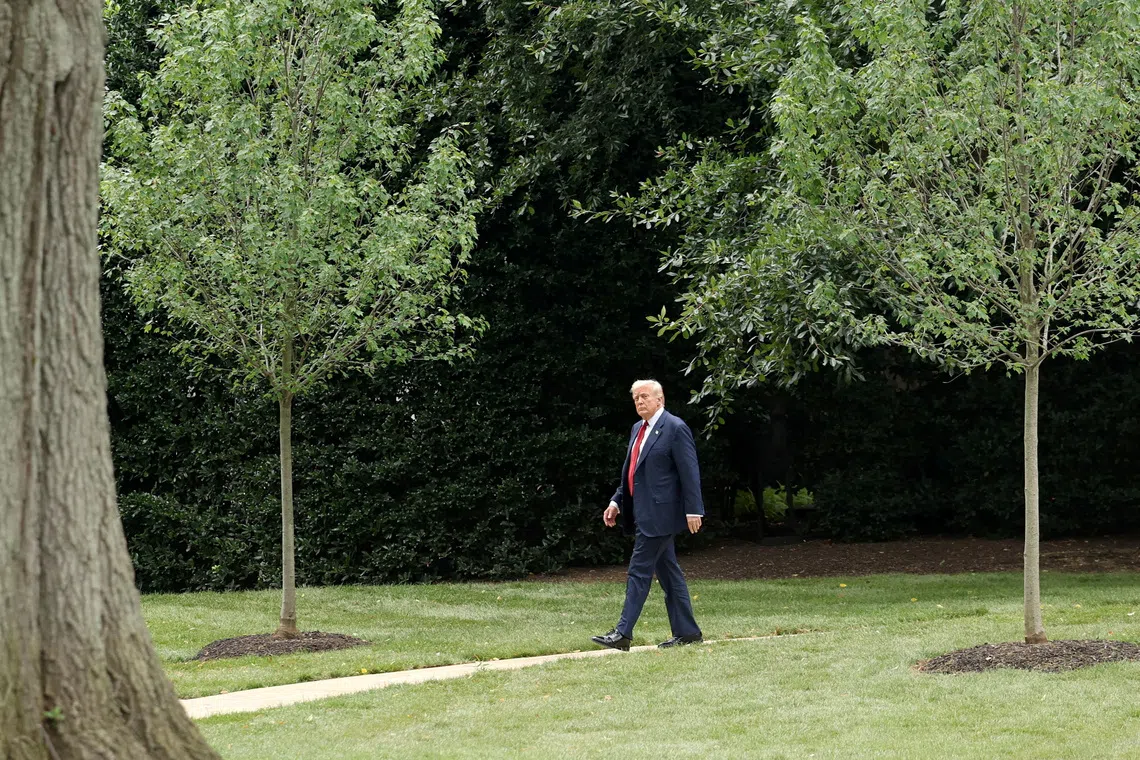News analysis
After diplomatic blitz on Ukraine and Gaza, Trump moves to passenger seat
Sign up now: Get ST's newsletters delivered to your inbox

US President Donald Trump has increasingly turned his attention to domestic issues.
PHOTO: REUTERS
Follow topic:
WASHINGTON – Pentagon officials sat down with a group of European diplomats in late August and delivered a stern message: The US planned to cut off some security assistance
More broadly, Pentagon official David Baker told the group, according to an official with direct knowledge of the comments, Europe needed to be less dependent on the US under President Donald Trump as the US military would be shifting its attention to other priorities, like defence of the homeland.
Some European diplomats fretted that the move could embolden Russian President Vladimir Putin.
On Sept 19, they may have been proven right.
Russian MiG-31 jets entered Estonian airspace
Hours later, Russian jets buzzed over a Polish oil platform, Warsaw said. Last week, Russian drones were downed in Poland
The US response to those incidents has so far been muted.
Mr Trump did not address the latest incursion for several hours, before saying it could be “big trouble”.
After last week’s Polish incident, he posted cryptically on his Truth Social app: “Here we go!”
His responses appear to fit an emerging pattern.
After months of proposing both ideas to solve or mediate some of the world’s most intractable conflicts, Mr Trump has largely withdrawn from diplomacy in recent weeks.
Instead, he has allowed, and in some cases pressed, allies to take the lead, with only distant promises of US help.
He has increasingly turned his attention to domestic issues, like tackling crime, confronting what he calls violent left-wing extremism and overhauling a major visa programme.
Returning to form
After an intense summer of diplomacy, including hosting Mr Putin in Alaska
After the US President spent the first several months of his term trying to secure a ceasefire between Israel and the Palestinian militant group Hamas, he has lately shrugged off moves by Israel that would seem to undermine the possibility of a deal to end the war in Gaza.
White House officials expressed disapproval when Israel bombed a Hamas office located in the territory of US ally Qatar
That Mr Trump would be wary of US involvement in major conflicts is in some ways unsurprising. He spent two years on the campaign trail arguing that the nation was militarily overstretched. Political opponents called him an isolationist.
But over the summer, a different Trump emerged. To the chagrin of some conservative political allies, he bombed Iran’s key nuclear sites
Now, analysts say, Mr Trump is returning to form.
Mr Aaron David Miller, a veteran US diplomat and senior fellow at the Carnegie Endowment for International Peace, said Mr Trump may have simply realised the conflicts are far more intractable than he had imagined.
“He’s not interested in doing anything unless he sees that the expenditure of effort and political capital will be worth the return,” Mr Miller said.
The White House did not immediately respond to a request for comment.
Mercurial president, exhausted diplomats
The President’s latest zig could easily be followed by a zag.
In April and May, he publicly floated walking away from the war in Ukraine, only to re-engage heavily on the issue.
Moreover, the White House’s disengagement has not been absolute. In recent weeks, some US weapons have begun flowing into Ukraine as part of a US-Nato security assistance initiative called the Purl programme.
Still, analysts expressed concern that the mild US reaction to Russia’s latest provocations will only encourage more aggressive steps by Mr Putin.
Further US disengagement “would lead us to more provocative actions from Putin as he sees Europe as weaker because it can be divided – especially without the US there to back it up”, said Mr Alex Plitsas, senior fellow at the Atlantic Council.
Several European diplomats in Washington privately expressed exhaustion at Mr Trump’s changeable attitude on Russia – and suggested another hardening of his stance towards Moscow could lack credibility.
Over the summer, those diplomats said, the mood was notably different.
At a Nato summit in June, Mr Trump heaped praise on European leaders and, in July, repeatedly threatened Russia with direct and secondary sanctions
But the anti-climactic summit with Mr Putin produced no breakthroughs and a major setback for Kyiv: Mr Trump left the meeting saying a ceasefire in Ukraine was not a precondition of lasting peace – a position held by Mr Putin, but not European allies.
In a testy Sept 4 call with European partners
The next week, Mr Trump told European Union officials they should hit China and India with 100 per cent tariffs to punish them for their purchases of Russian oil. He portrayed such a move as a precondition for US action, one official said.
Mr Trump’s supporters say he is only demanding that Europe stand up for its own security.
But some diplomats sense a trap. Such measures would be hard to get through the EU’s bureaucracy promptly, particularly as the bloc prefers sanctions to tariffs.
Two senior European diplomats in Washington also noted that Mr Trump has recently spoken of lowering trade barriers with India.
It is unclear if the Sept 19 Estonia incursion will alter Mr Trump’s calculus towards Russia.
His government appeared unmoved by a letter from lawmakers in Estonia, Lithuania and Latvia last week calling for reconsideration of Mr Trump’s plan to eliminate some security assistance.
“Many of our European allies are among the world’s wealthiest countries,” a White House official said. “They are fully capable of funding these programmes if they choose.” REUTERS

